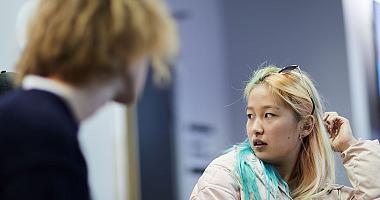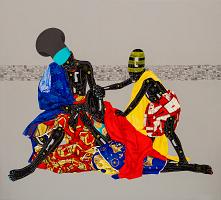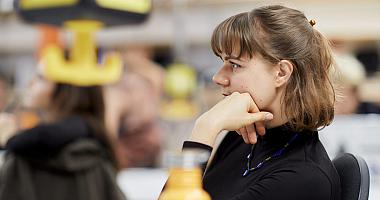MA Digital Media
Content navigation menu
Why study MA Digital Media at Goldsmiths
The MA Digital Media is unique in its combination of practical and theoretical approaches to contemporary media and technology.
- This exciting degree is designed to help you understand digital transformations in media, culture, and society and apply this understanding in practice, in the media and creative industries and in further research.
- The MA Digital Media has an established record - redefining media theory and practice since 2004.
- The programme will equip you with skills that can be applied to current and future developments in digital media, social media, computing, and other aspects of technology.
- The MA Digital Media educates aspiring media practitioners and academics as well as early and mid-career professionals who seek to reflect on their roles in a structured and stimulating learning environment designed to give all students up-to-the-minute knowledge of digital media and the skills to apply that knowledge to future developments.
- You'll study in one of the world’s leading media and communications schools. Media, Communications and Cultural Studies has been ranked number two in the UK for 'world-leading or internationally excellent' research (Research Excellence Framework, 2021) and 16th in the world (third in the UK) in the 2024 QS World Rankings for communication and media studies. In your options modules you will be taught by theorists and practitioners of international standing.
- Our students have access to state-of-the-art facilities including well-equipped lecture and seminar rooms, exhibition spaces, computer facilities and digital media suites.
- There are three pathways, so you can specialise in image making or data visualisation, or take a more theoretical approach.
Contact
If you have specific questions about the degree, contact Daniel Rourke.
Length
1 year full-time or 2 years part-time
Entry requirements
You should have (or expect to be awarded) a 2:2 undergraduate degree in a relevant/related subject. For the practice pathway you'll also need to submit a portfolio of work. You might also be considered if you have relevant experience and can show you can work at postgraduate level.
Fees
Home - full-time: £11800
Home - part-time: £5900
International - full-time: £23000
School
Programme overview
This is an exciting programme that offers a critical, contextual and practical approach to digital media and technology. It problematises approaches to the 'new' media in academic and professional debate, especially those that overemphasise the potential for radical social change led by a homogenised technology itself.
The programme is defined by its resistance to technological determinism and its insistence on the importance of addressing the social and historical contexts within which a range of media technologies are employed.
In order to provide a contextual framework and facilitate the conceptualisation of digital media and technologies as fully cultural forms and processes, the programme will draw on a range of disciplines including: media and cultural studies, sociology, anthropology and philosophy. However, the programme will remain focused on key contemporary concerns about the potential role of digital media in society and on refiguring the contours of the 'new' media debate.
This programme has three pathways:
Pathway 1: Theory programme
You'll learn about developments in digital media and technology. This pathway draws on media theory, critical theory, continental philosophy, science and technology studies, gender studies, critical race studies, the posthumanities, software studies and cultural studies to diagnose our present digital condition.
Comprised of one 30 credit compulsory module, one 30 credit recommended option and options to total 60 credits and the dissertation.
Pathway 2: Image Making
A theory and practice programme. Alongside engaging with digital media theory you will work with one or more of the following – animation, photography, video and other forms of moving image – to create installations, apps and single/multi-screen work that is responsive to a continually changing, and conceptually understood, digital landscape.
Students can explore new media theories and concepts in image making. This pathway is primarily aimed at students who already have some practical experience. It is meant to appeal to media industry professionals who are keen to reflect critically on their practice within a structured learning environment and graduates of practice-based courses.
Comprised of two compulsory modules, options to total 30 credits, digital media practice and the practice/theory project.
Pathway 3: Data Visualisation
A theory/practice programme. You'll learn how information is structured, gathered, sorted and figured into new knowledge. During the course, you'll develop investigative methods to explore data, using art, installations, workshops, graphic design, scripting, critical making and critical technical practice. The pathway also draws on theory from the posthumanities, software studies, machine learning and data analysis and the history of data modelling. The pathway is aimed at helping you to create innovative methods that reveal new knowledge inherent in a data-rich society.
Offers the opportunity to explore new media theories and concepts in data visualisation. No advanced prior knowledge of computation is required, but a willingness to learn about technology and media on a theoretical and practical level is.
Comprised of two compulsory modules, one option to total 30 credits, digital media practice and the practice/theory project.
What you'll study
For the Theory Pathway, you'll take the following compulsory modules:
| Module title | Credits |
|---|---|
| Digital Media: Critical Perspectives | 30 credits |
| Dissertation | 60 credits |
You'll choose one optional module from the following:
| Module title | Credits |
|---|---|
| Digital Culture: Critical Theory | 30 credits |
| or | |
| Photography and After | 30 credits |
| or | |
| Software Studies | 30 credits |
In addition, you'll choose 60 credits of optional modules from a list provided each year. View examples of recent optional modules.
Note about optional modules (if available): The above is indicative of the typical modules offered, but is not intended to be construed or relied on as a definitive list of what might be available in any given year. The module content and availability is subject to change.
Dissertation/Project
Students across all pathways are required to produce either a 12,000 word dissertation on a topic agreed by the student and supervisor, or a practice/theory project. The length of the practical element is dependent on the media and form used, and will be agreed on in advance with the supervisor.
Students undertaking the practice/theory project will also be expected to submit a 3-4,000 word analysis of their practice that locates it within the theoretical debates explored in the MA as a whole. This essay may be presented as a separate document or as an integral part of the project depending on the nature of the project, and is subject to agreement with both theory and practice supervisors.
What our students say

Entry requirements
You should have (or expect to be awarded) an undergraduate degree of at least second class standard in a relevant/related subject. If you're applying to the practice pathway, you'll also need to submit a portfolio of work. Further details are in the 'How to apply' section.
You might also be considered for some programmes if you aren’t a graduate or your degree is in an unrelated field, but have relevant experience and can show that you have the ability to work at postgraduate level.
International qualifications
We accept a wide range of international qualifications. Find out more about the qualifications we accept from around the world.
If English isn’t your first language, you will need an IELTS score (or equivalent English language qualification) of 6.5 with a 6.5 in writing and no element lower than 6.0 to study this programme. If you need assistance with your English language, we offer a range of courses that can help prepare you for postgraduate-level study.
How to apply
Apply directly to Goldsmiths using our online application system
You apply directly to Goldsmiths using our online application system.
Before submitting your application you’ll need to have:
- Details of your academic qualifications
- The email address of your referee who we can request a reference from, or alternatively a copy of your academic reference
- Copies of your educational transcripts or certificates
- A personal statement – this can either be uploaded as a Word Document or PDF, or completed online.
When applying, please specify in your personal statement which is your preferred pathway.
Additional application requirements
Pathways 2 and 3 include additional application requirements:
Pathway 2 (Image Making)
Applicants to Pathway 2 (Image Making) need to demonstrate the relevant experience and expertise via the submission of a portfolio of their creative work (still and/or moving image, using any techniques – including some digital ones). When submitting your application, please also submit (upload under 'additional') an example of your recent work in a related field, or include links to a page hosting that work. Please make sure you include your application reference number (which you will receive when you enter your online application) and the MA degree title.
You will also need to download and complete the Digital Media Questionnaire (Word). Please upload this as part of your applciation.
Pathway 3 (Data Visualisation)
Applicants to Pathway 3 (Data Visualisation) do not need to submit a portfolio. No advanced knowledge of computing is required of them. However, they are requested to explain in their personal statement their interest in Pathway 3, the state of their current technical knowledge and their wider experience with technology and computing so far, as practitioners and/or users. These applicants will also need a relevant first degree as above.
You'll be able to save your progress at any point and return to your application by logging in using your username/email and password.
When to apply
We accept applications from 1 October for students wanting to start the following September.
We encourage you to complete your application as early as possible, even if you haven't finished your current programme of study. It's very common to be offered a place that is conditional on you achieving a particular qualification.
Late applications will only be considered if there are spaces available.
If you're applying for funding, you may be subject to an earlier application deadline.
Find out more about applying.
Fees and funding
Annual tuition fees
These are the PG fees for students starting their programme in the 2025/2026 academic year.
- Home - full-time: £11800
- Home - part-time: £5900
- International - full-time: £23000
If your fees are not listed here, please check our postgraduate fees guidance or contact the Fees Office, who can also advise you about how to pay your fees.
It’s not currently possible for international students to study part-time under a student visa. If you think you might be eligible to study part-time while being on another visa type, please contact our Admissions Team for more information.
If you are looking to pay your fees please see our guide to making a payment.
Funding opportunities
Explore the Goldsmiths scholarships finder to find out what funding you may be eligible for.
Paying your fees
Find out about paying your tuition fees.
If you are a UK student you may be eligible for a postgraduate loan.
Meanwhile our Careers Service can also offer advice on finding work during your studies.
Additional costs
In addition to your tuition fees, you'll be responsible for any additional costs associated with your course, such as buying stationery and paying for photocopying. You can find out more about what you need to budget for on our study costs page.
There may also be specific additional costs associated with your programme. This can include things like paying for field trips or specialist materials for your assignments. Please check the programme specification for more information.
Student work
AR Planet by Yujin Yun, Moon Jung Hyun and Sam Oh
Careers
Where this degree can take you
Our programme provides a theory and practice pathway and prepares students for work in the following areas:
- Media and creative industries; advertising, marketing and PR (graduates of the MA Digital Media have found work with Virgin Media, Google, the BBC and other leading organisations worldwide)
- Research and academia (graduates from this programme have gone on to study for PhD degrees in higher education institutions around the world and also here with us)
- Media production and new media art (graduates have exhibited, published and produced work in photography, journalism, TV, documentary, film and multimedia)
Skills you'll gain
We provide graduates with skills that are cutting edge in:
- The critical analysis and/or creative production of digital media;
- The disciplinary knowledge and conceptual frameworks necessary for current and future forms of media and technology;
- The awareness of how digital media and technologies are re-shaping society from the ways we communicate (through social media and web 2.0) to the increasingly ‘smart’ environments in which we live.
Programme outcomes
The programme's subject specific learning outcomes require students to analyse and contextualise developments in digital media and technology with reference to key debates in the history, sociology, anthropology and philosophy of the media.
Students who opt for one of the practice/theory pathways will also be required to produce material of publishable standard and to evaluate the ways in which theoretical and practical insights intersect. All students will develop a wide range of transferable qualities and skills necessary for employment in related or unrelated areas. These are described by the Quality Assurance Agency as: 'the exercise of initiative and personal responsibility, decision-making in complex and unpredictable situations, and the independent learning ability required for continuing professional development'.
By the end of the programme students will be able to:
- Map and critically evaluate key debates in the field of new media
- Analyse and contextualise current and future developments in digital media and technology
- Evaluate and articulate key historical, sociological, anthropological and philosophical approaches to the study of digital media and technology
- Demonstrate in-depth knowledge of at least four differing areas of inquiry
- Demonstrate an advanced level of conceptual knowledge and (where relevant) practical skill appropriate for a sustained piece of work in the field
- Prepare and deliver clearly argued and informed work
- Locate, retrieve and present relevant information for a specific project
- Manage a complex array of competing demands and work effectively to a deadline
- Work resourcefully and independently
- Think critically and/or work practically within a given context





